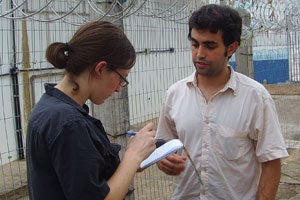At the southwestern tip of the Amazon, in Porto Velho, Rondônia, Brazil, stands Urso Branco, a prison notorious for deadly human rights violations. Conditions there are dire. The prisoners languish in hot, musty, overcrowded cells that reek of perspiration, urine, and excrement. They rarely see sunshine. It’s nowhere anyone would choose to be. But it was into this dank, dark, and volatile world that Clara Long ’11, Fernando Delgado ’08, and James Cavallaro, executive director of Harvard Law School’s Human Rights Program, insisted on going.
Urso Branco has a violent history. Two prisoner uprisings in 2002 left at least thirty-eight people dead. Another massacre occurred in 2004. These events earned Urso Branco an injunction, known as “provisional measures,” from the Organization of American States’ Inter-American Court of Human Rights in San José, Costa Rica. To monitor prison conditions, the court requires periodic reporting from Brazil’s federal, state, and prison authorities, and from the NGOs and human rights attorneys who represent the inmates.
Long, a student enrolled in the HLS Human Rights Clinic, Delgado, a fellow with the Human Rights Program, and Cavallaro, the professor who oversees the clinic, spent two days in September investigating the prison in preparation for a court hearing to consider Brazil’s motion to lift the provisional measures. They were assisted by clinical student Alexia De Vincentis ’10, who did legal research for them off-site and later joined them in Costa Rica, where the four of them prepared a devastating case against the prison. They documented that guards routinely fired live rounds at prisoners as they cowered in their cells; that some prisoners still had bullets lodged in their bodies months after being hit; and that torture was systematic. Based on their findings, and on presentations by attorneys for Justiça Global and Comissão Justiça e Paz, two Brazilian NGOs also monitoring the prison, the court ruled, on Dec. 14, 2009, to continue provisional measures. It ordered Brazil to implement all necessary measures to guarantee the life and physical integrity of the prisoners and prison staff.
It was a significant win. “We were mostly fighting an uphill battle in a context in which the court had lifted provisional measures in similar cases,” says De Vincentis.
Gathering the data needed to persuade the court was far from easy, but exemplifies what the clinic is all about. “We try to teach students what human rights work is,” says Cavallaro. When it comes to places like Urso Branco, he says: “It is important that students understand the dynamics of prisons. You must talk to everyone: guards, wardens, doctors, administrators, and the prisoners. Students must learn to document conditions in the cells.”
That’s a lesson learned only by visiting the prison. This fall, Long, Delgado, and Cavallaro successfully negotiated access to Urso Branco’s cells. Guided in their fact-finding by De Vincentis’s legal research and advice, they entered more than 20 cells, spoke with more than 100 inmates, and amassed documentary and physical evidence that corroborated the prisoners’ allegations of gunfire and torture. One of the prisoners surprised Long by pressing a gift into her hand as she exited his cell: A necklace with a cross knotted in the middle. “It’s made of red string,” she says, “perhaps pulled from a piece of clothing or a towel.” She brought it home and keeps it hanging in her room.
To prepare for the court hearing, the team next flew to Costa Rica, met De Vincentis there, and worked nearly nonstop for three days. In an adversarial proceeding, Cavallaro, Delgado and lawyers for Justiça Global and Comissão Justiça e Paz urged the court to continue provisional measures. The students helped shape their rebuttals to arguments made by Brazil’s large delegation.
Delgado believes that the clinic’s work is making a difference. “The situation now is appalling,” he concedes. “Some things have changed, but not enough. It is safe to say, though, that things would be a lot worse if there were no international attention on the prison.”
